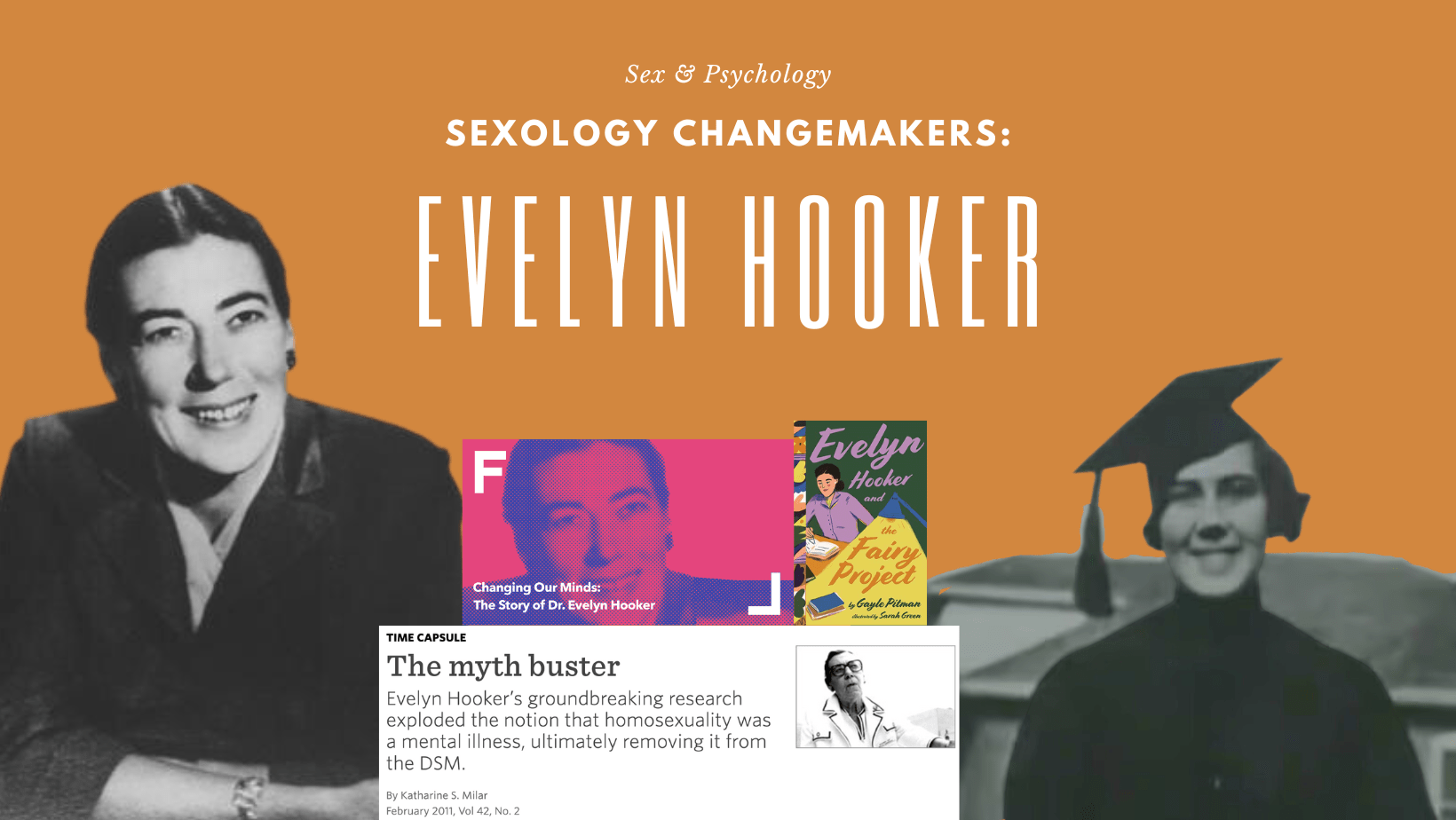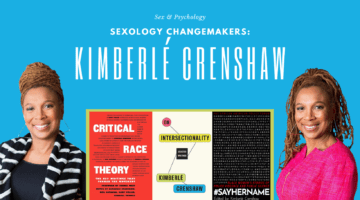Sexology Changemakers: Evelyn Hooker
April 4, 2024 by Zoe Moscovici
In popular retellings of the history of sex research, we tend to hear a lot about figures such as Sigmund Freud, Alfred Kinsey, and William Masters. While their work was obviously incredibly influential, many other individuals who made important contributions to the field are often left out of the story. One essential, yet underrecognized trailblazer is American research psychologist Dr. Evelyn Hooker. Her groundbreaking work challenged the pathologization of homosexuality and instigated a monumental shift in the societal understanding of sexual minorities.
In this post, we’ll explore Dr. Hooker’s key contributions and legacy. To learn more about other “hidden figures” in the history of sex, check out the previous posts in our Sexology Changemakers Series on Shere Hite, Virginia Johnson, June Dobbs Butts, and Kimberlé Crenshaw.
Early life:
Evelyn Hooker, originally known as Evelyn Gentry, was born in North Platte, Nebraska in 1907. She studied psychology at the University of Colorado Boulder on a scholarship for her undergraduate degree, later obtaining her Ph.D. in psychology at Johns Hopkins University and then going on to teach at UCLA. As both a student and professional, Hooker constantly faced gender discrimination and sexism, which fostered a deep understanding and compassion for the challenges of social stigma.
Turning point:
While Hooker worked at UCLA in the 1940s, she befriended a gay former student, Sammy From, whose influence ultimately changed the course of her career and the field of psychology more broadly. Sammy introduced her to the queer underground scene in Los Angeles, where she met many gay individuals who seemed quite well-adjusted. At the time, homosexuality was formally categorized as a mental disorder in psychiatry; however, as she got to know members of the community, they appeared to be just as happy and healthy as everyone else and did not appear to be suffering from some kind of mental health problem. Hooker soon applied for and was awarded a research grant from the National Institutes of Mental Health (NIMH) to formally investigate her observations.
Research:
This project turned into a landmark study titled “The Adjustment of the Male Overt Homosexual,” which was published in the Journal of Projective Techniques in 1957. This was the first study to collect data on a group of homosexual males who did not come from exclusively clinical or institutionalized settings, such as mental hospitals or jails. Her study found no significant differences in the psychological well-being of heterosexual versus homosexual men. This crucial piece of evidences was instrumental in the American Psychiatric Association’s subsequent decision to declassify homosexuality as a mental disorder in the DSM in 1974.
Legacy:
Upon its release, her work became quite controversial, but she endured. Hooker later went on to chair the NIMH Task Force on Homosexuality, which produced what became famously known as the “Hooker Report” in 1969, advocating for the decriminalization of homosexuality.
Evelyn Hooker’s legacy is not just one of scholarly achievement, but of profound human impact. Her ethnographic approach was able to humanize and destigmatize LGBTQ+ individuals, while her scientific rigor gave her advocacy the credibility needed to be effective. As we delve further into the intricate psychological aspects of sexuality, Dr. Evelyn Hooker inspires us to pursue knowledge with empathy and use our insights to foster a more inclusive and compassionate society.
References:
- Andrew M.Boxer, PhD & Joseph M.Carrier, PhD (1998) Evelyn Hooker, Journal of Homosexuality, 36:1, 1-17, DOI:10.1300/J082v36n01_01
- Department of Health, Education and Welfare, “Final Report of the Task Force on Homosexuality, October 10, 1969 (RG 4/2, Records of the Office of the Executive Vice-President, William James McKeefery),” VT Special Collections and University Archives Online, https://digitalsc.lib.vt.edu/VTLGBTQ/RG_04_02_McKeeferyWilliam_Records_B19_F766_1969_1010.
- Drescher J. Out of DSM: Depathologizing Homosexuality. Behav Sci (Basel). 2015 Dec 4;5(4):565-75. DOI: 10.3390/bs5040565.
- Hooker, E. (1957). The adjustment of the male overt homosexual. Journal of Projective Techniques, 21, 18-31. , DOI: 10.1080/08853126.1957.10380742.
Image credit: Collage made with Canva,
Images sourced from Los Angeles Conservatory, American Psychological Association, and the film “Changing our Minds: The Story of Dr. Evelyn Hooker.”

Dr. Justin Lehmiller
Founder & Owner of Sex and PsychologyDr. Justin Lehmiller is a social psychologist and Research Fellow at The Kinsey Institute. He runs the Sex and Psychology blog and podcast and is author of the popular book Tell Me What You Want. Dr. Lehmiller is an award-winning educator, and a prolific researcher who has published more than 50 academic works.
Read full bio >


